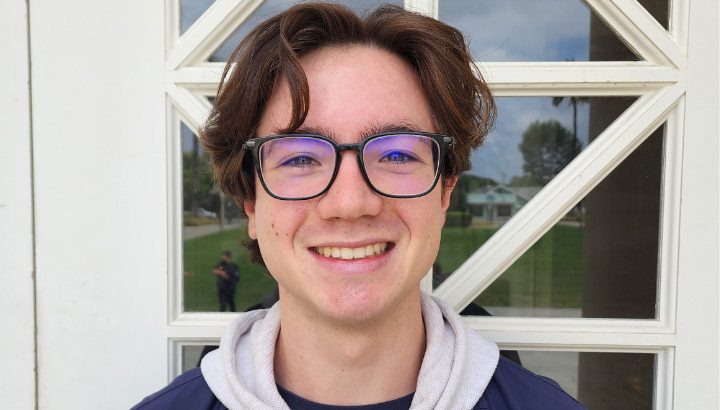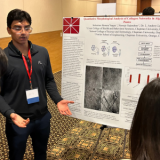
Gene Haas Recipient Advances Research in 3D Printing: Matthew Shugarte Engineers New Pathways to Succeed in Fowler
November 7, 2023
Name: Matthew ‘Matt’ Shugarte
Year: Junior
Major: Electrical Engineering
Minor: Musical Theatre
Extracurriculars and Involvements: Tech Shop Assistant, Undergraduate Research Assistant, Triathlon Club, Gene Haas Foundation Scholarship Recipient, Incoming CalTrans Intern
For many students, getting involved on campus may initially seem intimidating. Yet, it remains one of the most exciting aspects of the college experience. Social and academic clubs provide the opportunity to create meaningful connections with other students. Conducting research also allows students to gain real-world experiences in preparation for careers in STEM. For Matt Shugarte, getting involved at the Fowler School of Engineering since his first year was just the beginning of his long-lasting impact within the community.
Shugarte (Electrical Engineering ‘25) started his career at Fowler Engineering as a Tech Shop Student Assistant. There, he acquired valuable skills in 3D printing, soldering, and general engineering under the guidance of Makerspace professionals. Within a few weeks, Shugarte was able to teach these skills to his peers, including those in his graduating cohort. Since then, Shugarte has continued to make meaningful contributions to the engineering community. Most recently, his research centered around 3D printing increased exposure to the possibilities imaginable with Fowler’s facilities. This year, he was not only selected to present at the Southern California Conference for Undergraduate Research (SCCUR) but also joined the California Department of Transportation as one of their CalTrans Interns.
Shugarte shared his experiences at Fowler Engineering thus far and provided insight for students interested in pursuing a similar pathway into research.
Q&A with Matt Shugarte
Q: What was one of your primary motivations to get involved on campus early?
Shugarte: There was an idea where I was a little bit ‘behind the curve.’ I didn’t grow up with the most well-versed engineering background. I knew I wanted to do it, but I was under the impression that I couldn’t seriously take on electrical engineering until I got to Chapman. Now that I’ve started college, I thought, ‘Now is the time to find things outside of class.’ I learn better by applying what I’m learning so that I can start thinking critically about it. I realized no one else can be your own motivator. You’ve got to pick yourself up and get to it.
Q: What is a notable achievement or contribution that you’re most proud of? Why?
Shugarte: It was interesting starting to work in the Tech Shop during my second semester of freshman year. We were encouraged to make things, but we didn’t really know what to do. I made a lightbox using laser-cutting, 3D printing, coding, and soldering. I thought it was pretty cool. What I appreciated the most out of it was making workshops. Over the summer, we taught middle and high school students how to make these little lamps. While they were working on them and got them to work, their faces just lit up along with the light themselves. I didn’t have that when I was younger, so, to see those kids enjoy what they made, I thought it was pretty special. Knowing the impact of something so simple can have such an effect on people.
Q: Who has inspired you to take opportunities in research and working for Fowler? Who has been a role model for you in those fields?
Shugarte: I’d have to go to my mom for that one. My mom worked hard to put me in this position to go to school. Thankfully, throughout high school, I was able to work hard enough and get scholarships to help pay for college. Now that I’m here, that’s pretty much the focal point of where it really counts and being able to take advantage of these opportunities. I know it may not be the most direct path, or the quickest way to get an internship. It may seem like sidequests, but in the end, these opportunities contribute to my skills. Knowing that I’m building my skills, when I actually look for a job, it’ll help me get a job, and in turn, help my mom out. That’s always been in the back of my head. She’s been really dredging through the mud, so I have to dredge through the mud to help her get through it.
In terms of a role model, it would be Dr. Wagner. She’s shown me how personal a researcher can be without having to be strict or stuck up. Her appreciation of really using every skill you possibly can, really speaks to her resourcefulness, which is something I’ve taken into my research experience. There’s never been a question of, ‘How qualified are you?’ It’s usually a question of, ‘How are you going to get the answer?’ It doesn’t matter where you come from. It matters how you can get the results.
Q: How do you continue to support students while also prioritizing your studies and other responsibilities? What were some challenges you’ve had to overcome?
Shugarte: While working at the DCI Lab, it’s a little tricky. Ideally, I should’ve gone through all the training before the school year started, but circumstances change. I try to help students and troubleshoot as best as I can. But if I recognize I don’t have the skills to help them with what they need, my first instinct is to immediately connect them with someone who can. That way, they can get what they need without wasting so much of their time. It’s been interesting finally getting to the engineering aspects of my classes. It’s sort of like learning a new language. There are new terms. Things interact and behave differently. I went to a school that prioritized the liberal arts, like writing and reading. It was a bit difficult to make the transition, and it’s taken me a few years to get comfortable with these newer terms. But being able to see those challenges through and go along with them, accepting the humbling experience of learning something new, it’s been great. I appreciate the challenge of learning new things.
Q: Where do you see yourself and your research in the immediate future? What about beyond Fowler?
Shugarte: 3D printing has become really advanced over the years. My first impression was, ‘Wow, you can pretty much make everything if you really sit down and get to it.’ Luckily enough, other researchers have found that to be true as well. The reasoning behind researching 3D printing has been that biomedical experts want to use 3D printing as a method to carry into biomedical treatment. Even though technology has been expanding, it’s been difficult because there’s not that much research. My research specifically pertains to how 3D-printed structures react to different types and levels of stress, to see what their tolerances are. In doing so, we can determine which materials and structures are best suited for those situations. The application I can see my research pertaining to is potentially contributing to a runner’s health by limiting shock that induces shin splints.
For example, one of my structures is very rigid. It has a high tolerance for stress, however, it degrades quicker. This would be ideal for a tennis player, who is consistently stomping and holding their momentum. Another structure, which moves a lot more and has a higher endurance, may be suited for running.
These are just some of the applications of what my research is about. I don’t know if I’ll be continuing it with other opportunities after graduation. Based on how my research progress has been over the summer, I hope other researchers can use what data I collected, and go ahead and use that for their own research. I don’t know what that would consist of. But I think being able to use that data to collaborate with physical therapists, physicians, and athletes, to see how they can implement those structures, may be able to help them out.
Q: What advice do you have for current and prospective Fowler students looking to pursue similar interests?
Shugarte: There’s such a preconceived notion of what research or engineering or involvement is. I knew for myself, I was very timid in getting involved. I knew I didn’t have any experience to get involved. But how else are you going to get experience? I think, just being willing to humble yourself through experiences, where you know you’ll have to grow a lot, it does get a lot easier. Acknowledging that you can’t do everything yourself, that’s something that also contributes to how involved you get. There are a bunch of other students too, so, being able to learn how to collaborate can also help in getting more done. But I think getting ready to get humbled is the first step engineering students should go through, to get ready, to get involved.

